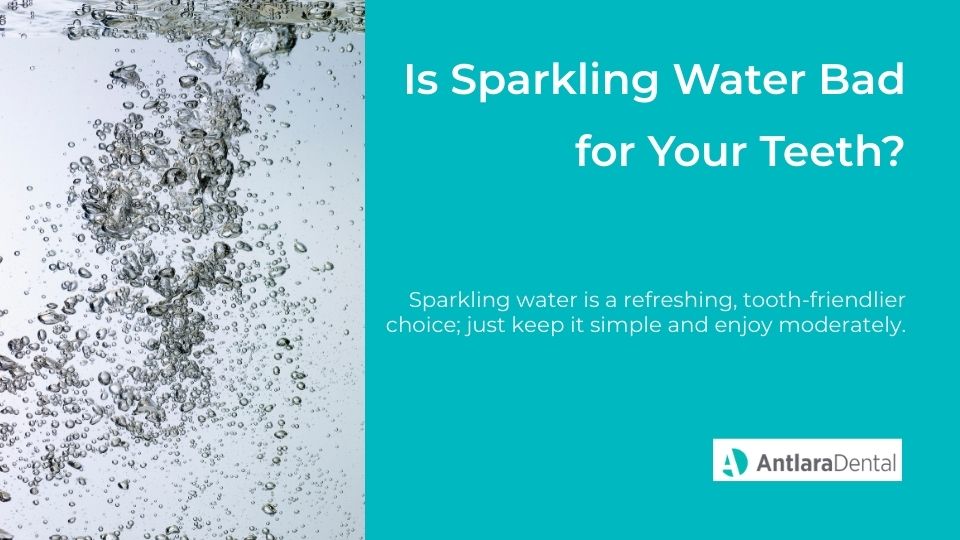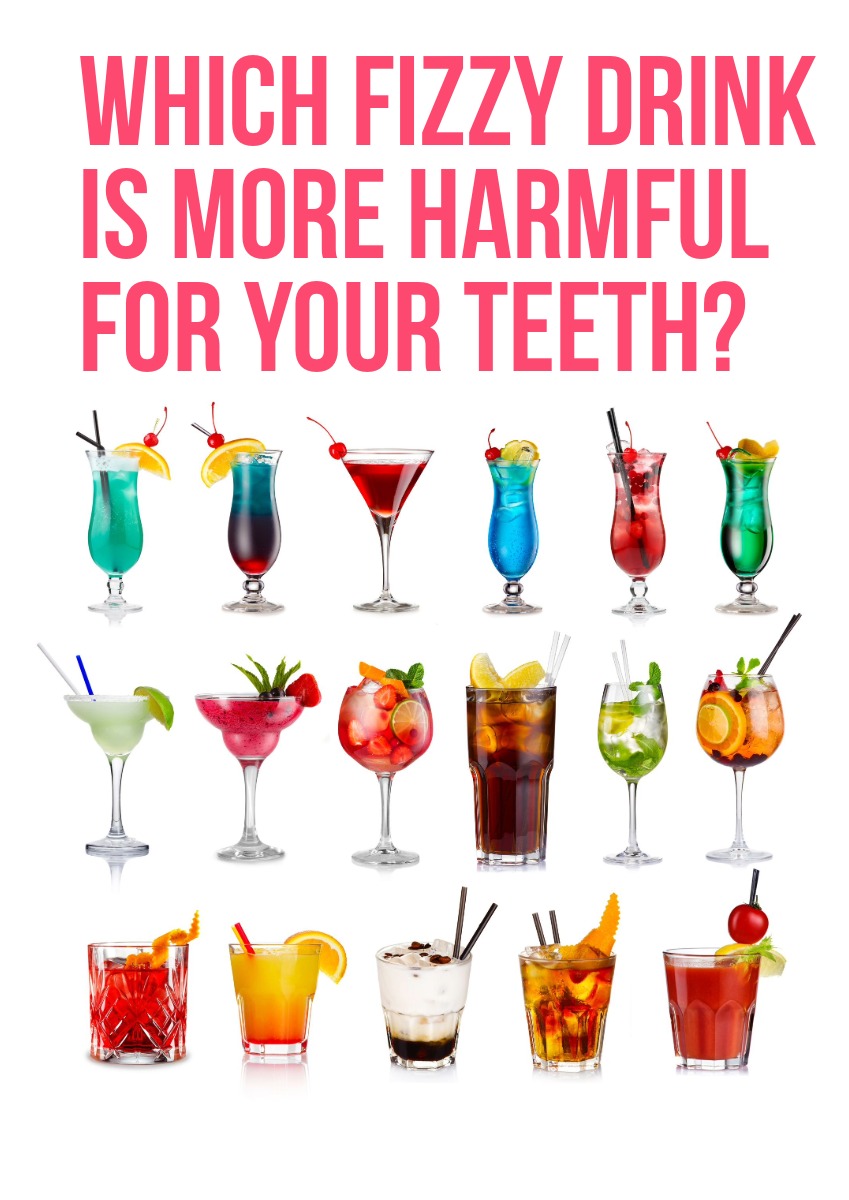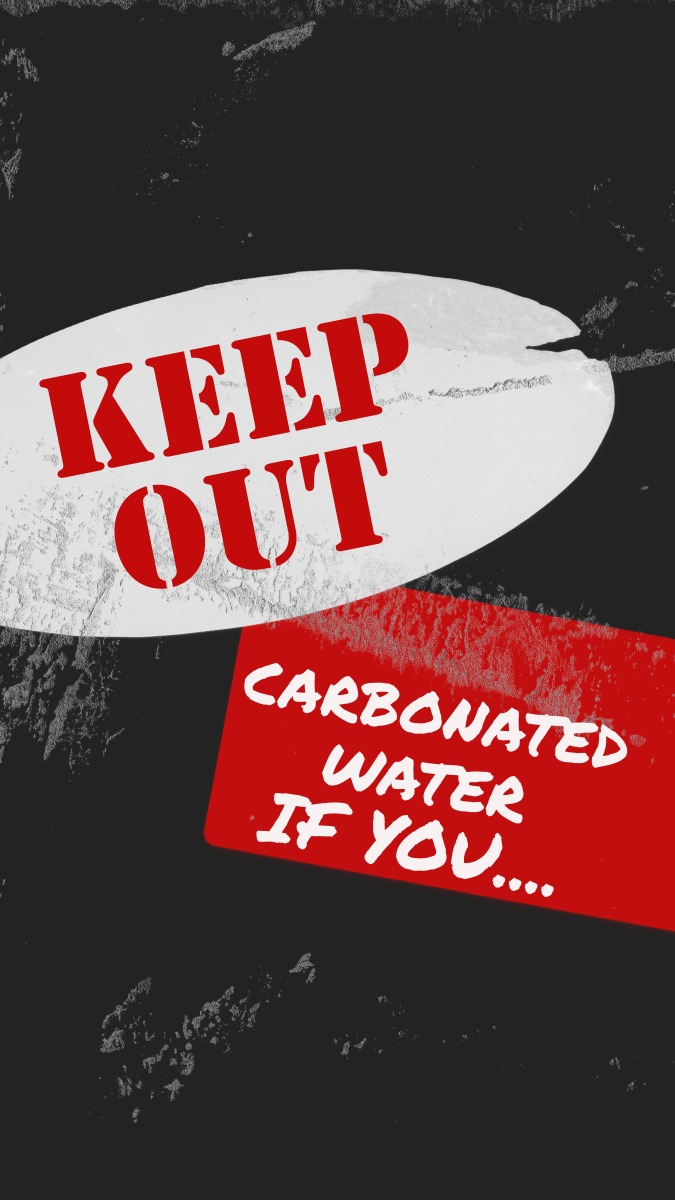In recent years, sparkling water has become a favorite for many people due to its refreshing taste and perceived innocence compared to sugary drinks. But the question that comes to mind is still valid: "Does sparkling water damage teeth?" While plain mineral water might not seem like a big deal at first, things become complicated when you consider the acidity of the water and the sensitivity of tooth enamel. Here we'll go over the facts about carbonated water's safety and the precautions you should take to keep your teeth healthy.

Sparkling water and oral health
Carbonated water, mineral water, or soda is a fizzy beverage made by pressurising water with gaseous carbon dioxide (CO2). With this method, carbonic acid, a mild acid, is formed in the water. Due to the carbonic acid formed, the pH value of carbonated water is lower than that of normal tap water (i.e., it is more acidic). For example, while tap water typically has a pH value close to neutral (~7), plain carbonated water may have a pH of around 5 to 6. This value is still slightly acidic but much higher than the pH of sugary carbonated beverages (around 2-3).
The critical pH threshold for tooth enamel is considered to be approximately 5.5. This means that when the environment falls below 5.5, mineral loss (demineralization) begins on the enamel surface. Since plain sparkling water hovers around this threshold, it is not expected to have a significant effect on tooth enamel on its own. However, it is ultimately an acidic beverage; it is important to remember that prolonged and continuous contact can cause cumulative damage, even if it is minor.
Flavored sparkling waters are more acidic:
If citrus flavors such as lemon or grapefruit, or similar flavorings, have been added to the sparkling water you drink, the situation changes. These types of flavored carbonated waters generally contain extra acids such as citric acid and phosphoric acid, which can cause the pH value to drop even further, to around 3. These levels are quite risky for tooth enamel. Some studies suggest that flavored mineral waters may have a potential for erosion similar to that of pure orange juice. So lemon soda or fruit-flavored mineral water is not exactly harmless for teeth.
The protective role of saliva:
Fortunately, we have a natural defense mechanism in our mouths: saliva! Saliva neutralizes acids in the mouth and helps restore lost minerals (remineralization) by coating the tooth surface with a protective layer. When we eat or drink something, saliva flow increases and the acidic pH is quickly balanced. If you don't consume carbonated drinks one after another without a break and give your mouth a little "rest," saliva will compensate for the damage caused by acid over time. However, in people with dry mouth or reduced saliva production, this protective effect is weakened. In such cases, even a mildly acidic beverage like carbonated water can cause more damage to tooth enamel than usual.
Comparing different drinks

Sparkling water vs. sugary sodas (sugary drinks such as cola):
As you know, soft drinks such as cola and soda are a nightmare for dental health. Their high sugar and phosphoric/citric acid content lowers the pH to extremely low values of 2-3. At such acidity levels, tooth enamel erodes rapidly and the risk of decay increases. Plain carbonated water, on the other hand, contains no sugar and has a much milder acidity.
Sparkling water vs. flavored carbonated water:
Lemon, blackberry... there are many flavored mineral waters on the market. These flavors are usually provided by substances such as citric acid, so the acid level of flavored carbonated waters is much higher than that of plain mineral water. Whether sweetened with sugar or artificial sweeteners, flavored sodas are more harmful to teeth than plain water or plain mineral water. In fact, some studies have observed that tooth surfaces exposed to flavored mineral water erode as much as those exposed to orange juice. If dental health is a priority for you, the best option is to choose unflavored plain carbonated waters.
Sparkling water vs. mineral water (natural mineral waters):
Natural mineral waters are waters that come from underground sources and contain various minerals. Some are naturally carbonated, while others are carbonated by adding carbon dioxide. Minerals such as calcium and phosphate in mineral waters can partially counteract the corrosive effects of acid. Laboratory studies have shown that both still and carbonated mineral waters cause almost no erosion on tooth enamel. Although the effect of carbonated water is slightly greater than that of still water, it is negligible when compared to acidic beverages such as cola. In other words, mineral-rich mineral water is a much safer option for teeth than carbonated beverages.
Sparkling Water vs. Tonic Water: Tonic water has a bitter taste due to the quinine it contains, but it actually contains a high amount of sugar. Although many people are unaware of this, tonic water is almost as sugary as cola and is just as harmful to dental health. Because it is acidic and sugary, tonic water should be considered a risky drink for teeth.
How to protect your teeth if you drink sparkling water
You may not need to completely eliminate carbonated beverages from your life; here are some tips for consuming carbonated water without damaging your teeth:
Choose the simple ones:
Mineral waters that contain no added sugar or flavorings, and consist only of water and carbon dioxide, are the safest choice for your teeth. Make it a habit to drink plain soda instead of lemon-flavored, fruit-flavored, or sweetened carbonated waters.
To drink with your meal:
Instead of sipping carbonated water throughout the day, it is better for your teeth to consume it with meals. Since saliva flow will already increase during meals, the harmful effects of acid will be balanced more quickly. In addition, since you will drink water at a more normal pace instead of sipping it slowly while eating, your teeth will not be constantly covered in acid.
Consume in one go, do not sip continuously:
If you have a bottle or can of mineral water, finish it in a shorter period of time rather than taking sips every half hour. Drinking small amounts over a long period of time leaves your teeth exposed to acid for hours. However, if you drink it all at once, your saliva will neutralize the acid in your mouth in a short time.
Use a pipette:
If you have teeth that are particularly sensitive to acid erosion, drinking through a straw may be a good idea. A straw directs the liquid directly into your throat, so that your tooth surfaces come into contact with less acid.
Then rinse with water:
After finishing the carbonated water, rinse your mouth with a sip of plain water or drink a few sips of water. This simple step removes acid residues and helps the pH level of the oral environment return to normal quickly.
Don't brush right away:
Brushing your teeth immediately after consuming an acidic drink is like sanding the softened enamel surface. Therefore, wait at least 20-30 minutes before brushing your teeth after drinking soda. During this time, your saliva will neutralize the acid and partially restore the hardness of the enamel. (If you drink soda before going to bed at night, be sure to brush your teeth afterward; this warning only applies to the short period immediately after consuming acid.)
Make fluoride your friend:
Using fluoride toothpaste and mouthwash helps strengthen tooth enamel. By regularly using fluoride products, you can provide extra protection against acid erosion.
Regular dental checkups:
Finally, don't skip your routine dental checkups. Your dentist can detect early enamel erosion or white lesions and warn you about them. If you consume carbonated drinks frequently, be sure to mention this to your dentist; they will give you personalized advice.
Who should be extra careful?

Although carbonated water may seem harmless to most people, some individuals are more prone to tooth enamel erosion and decay. If you are in the risk group, it is important to take extra care to protect your dental health when consuming these beverages.
Children and young people:
Young children in particular can be very fond of acidic drinks. Since children's tooth enamel is not yet fully developed, frequent consumption of such drinks can lead to erosion and decay at an early age. Parents should try to encourage their children to drink healthier beverages such as water or plain mineral water instead of soft drinks.
Weak or sensitive teeth:
Some people have genetically thinner tooth enamel or enamel that has worn away over the years. In this case, teeth are more vulnerable to acidic drinks; even mild acids can cause sensitivity. If your teeth are already worn or sensitive, you should avoid carbonated drinks as much as possible.
Those with gum recession:
The root surface exposed in people with receding gums is not as durable as enamel and is very sensitive to acids. Therefore, if you have receding gums, even mineral water can cause rapid erosion and sensitivity on the root surface.
Those with dry mouth:
Saliva is the most important defense against acid erosion of teeth. People who suffer from dry mouth have weaker protection, so acidic drinks (even sparkling water) can erode tooth enamel more than normal. People in this situation should make sure to drink plain water rather than sparkling water when they are thirsty.
Orthodontic treatment patients:
Consuming acidic beverages while wearing fixed braces can cause white spots (mineral loss) to form around the brackets. Orthodontists recommend avoiding carbonated beverages during treatment, as the acid that accumulates around the braces can lead to unpleasant surprises (stains, early cavities) at the end of treatment.
In short, people who are at risk or have special circumstances when it comes to dental health should think twice before consuming carbonated water. Even a small oversight can lead to more serious problems in these groups.
Conclusion & dental experts' opinions
The consensus among dentists is that plain mineral water is a much better alternative for teeth than sugary, acidic drinks such as cola and fruit juice (in short, it is the lesser of two evils). However, this does not mean that sparkling water is completely harmless. Ultimately, by adding carbon dioxide to water, we create a certain amount of acid, which may have a potential effect on tooth enamel.
You can enjoy sparkling water with moderate consumption and good oral hygiene. Drinking one or two bottles of plain mineral water a day generally does not harm your teeth, provided you rinse your mouth with water afterward and brush regularly. However, as dentists always remind us, the best and safest drink for your teeth is plain water.
In conclusion, it is up to you to balance your dental health with your consumption of carbonated water. As with everything else, as long as you don't overdo it, there is no cause for concern.
FAQ
Below you will find frequently asked questions and answers about the effects of mineral water on teeth.
Is sparkling water bad for your teeth?
Plain sparkling water is much less harmful to your teeth than sugary, acidic soft drinks. Since it does not contain sugar, it poses a low risk of tooth decay. However, it is not completely harmless; after all, it is acidic and, if consumed frequently and for long periods of time, can cause mineral loss (erosion) in tooth enamel. Flavored or sugary sodas are particularly harmful to teeth. However, there is no evidence that drinking plain mineral water once or twice a day with meals significantly increases the risk of cavities. Remember, no beverage is as safe for your teeth as plain water.
Can I drink sparkling water every day?
Drinking sparkling water every day generally does not cause any problems; what matters is how you drink it. If you sip it frequently throughout the day, your teeth will be constantly exposed to acid, which can cause minor but cumulative damage. Instead, if you drink sparkling water in one go and then rinse your mouth with water, it won't be a problem even if you drink it every day. So yes, you can drink it every day, but don't overdo it and pay attention to how you drink it!
Should I brush my teeth right after drinking sparkling water?
No, do not brush your teeth immediately after drinking an acidic beverage such as sparkling water. Acid temporarily softens tooth enamel; brushing at this time can cause abrasion. The best thing to do is to rinse your mouth with water after drinking soda and wait 20-30 minutes before brushing your teeth. This allows saliva to neutralize the acid and the enamel to harden again. Of course, continue with your normal routine of brushing your teeth twice a day, just avoid brushing immediately after drinking acidic beverages.
Is sparkling water bad for your teeth Reddit?
Many people discuss the effects of sparkling water on teeth on online platforms (such as Reddit). In general, user experiences align with the scientific information we have shared here: Most people agree that plain sparkling water does not cause significant harm to teeth when consumed in moderation. However, it is also frequently emphasized that flavored/citrus sodas or sipping throughout the day are not good for teeth. Of course, it is more appropriate to listen to what dentists and scientific research say rather than relying on online comments.
Does sparkling water weaken bones?
No, there is no evidence that carbonated water weakens bones. This rumor is probably related to the phosphoric acid in cola drinks, but plain carbonated water does not contain such substances.
Can sparkling water affect your gums?
Sparkling water has not been shown to cause any significant direct damage to the gums. However, if it erodes tooth enamel and causes decay, it can indirectly affect gum health. In particular, in people with receding gums, acidic drinks can cause sensitivity when they come into contact with exposed roots.
Sources:
1 The Korean Journal of Orthodontics 2018; 48(1): 48-56. Published online: 19 November 2017 DOI: https://doi.org/10.4041/kjod.2018.48.1.48 Effect of carbonated water manufactured by a soda carbonator on etched or sealed enamel
2 MDPI and ACS Style
Inchingolo, A.M.; Malcangi, G.; Ferrante, L.; Del Vecchio, G.; Viapiano, F.; Mancini, A.; Inchingolo, F.; Inchingolo, A.D.; Di Venere, D.; Dipalma, G.; et al. Damage from Carbonated Soft Drinks on Enamel: A Systematic Review. Nutrients 2023, 15, 1785. https://doi.org/10.3390/nu15071785
3 The erosive potential of flavoured sparkling water drinks CATRIONA J. BROWN, GAY SMITH, LINDA SHAW, JASON PARRY, ANTHONY J. SMITH First published: 03 January 2007 https://doi.org/10.1111/j.1365-263X.2006.00784.x
4 Investigation of mineral waters and soft drinks in relation to dental erosion
- Parry, L. Shaw, M. J. Arnaud, A. J. Smith First published: 20 December 2001 https://doi.org/10.1046/j.1365-2842.2001.00795.x
Möchtest du den gesamten Blogbeitrag ins Deutsche übersetzt haben oder bevorzugst du eine gekürzte, aufbereitete Version in Form eines informativen Blogartikels auf Deutsch? Falls es sich um Letzteres handelt, gib bitte an:
- Welche Zielgruppe du ansprechen möchtest (z. B. allgemeine Leser, Eltern, Zahnärzte)?
- Soll der Text sachlich-informativ bleiben oder eher locker geschrieben sein?
- Gibt es ein bevorzugtes Layout oder Format (z. B. Zwischenüberschriften, FAQ am Ende)?
